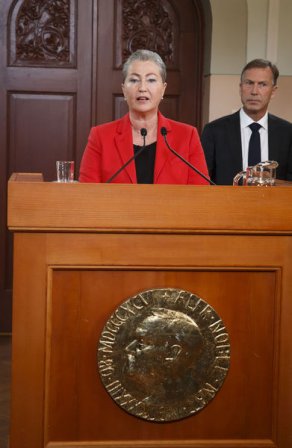
Chair of the Nobel Committee, Kaci Kullman Five, announcing the Nobel peace Prize 2015
The choice of the Tunisian quartet as the receiver of the Nobel peace prize is surprising, but by no means unreasonable. Unlike the case of US President Barack Obama, who received the prize for his intentions rather than his achievements, this time, the prize is awarded to politicians who are in the midst of a difficult transition process. The award should remind us just how remarkable it is that Tunisia’s political elite has managed to avoid armed struggle and civil war, when all the other countries affected by the Arab spring have descended into civil war or renewed authoritarianism.
However, it is important to keep in mind that Tunisia has not completed its democratic transition. Problems abound – let me just mention a few: The alienation of the young generation; the worrisome increase in salafi-jihadist activity; the simmering discontent in the inland regions; and the flawed process of transitional justice which has still only just started. While Tunisia’s political elite deserve praise for their unusual will to compromise, they are not in touch with the Tunisian street. A 2014 Pew poll showed that while fewer people now agree with the statement “democracy is preferable to other kinds of government”, more agree with the statement “Sometimes non-democratic government can be preferable.”
The jihadist threat, so horribly illustrated by the June massacre of tourists in Sousse, cannot be blamed on the post-revolutionary regime. Radical Islamism developed in Tunisia partly as a result of Ben Ali’s harsh repression of the moderate Islamists in Ennahda party, and these days, the chaos in Libya nurtures jihadist movements that may easily infiltrate Tunisia’s borders. But while the problem was not created by the current regime, it has to deal with it, and thus far it has not been very successful. The result is a sense of insecurity and, importantly, a dramatic decrease in the number of tourists who visit the country.
Tourism is one of Tunisia’s most important sources of revenue, and the current drop adds to already huge economic problems. Unemployment is high, and about 25 per cent of Tunisia’s citizens are poor. After the revolution, dissatisfaction in the underprivileged inland regions became apparent, and the tensions between coastal and rural areas amount to a national schism.
In other words, there is no lack of threats to Tunisia’s fragile process of democratization. Exactly because of this fact, it is a welcome encouragement that the brokers behind the deal that saved the process at a precarious point are given such high-profile recognition of their work. While Tunisia still suffers from many problems that need political solutions, a prerequisite for finding those solutions is a pragmatic political elite that manages to put parochial concerns aside for the greater common good.
This is why it is not far fetched to view this year’s award also as a rebuke to the other Arab elites who chose to lead their countries into bloody strife rather than lose some or all of their power: Syria’s dictator Bashar al-Asad, Egypt’s military, Yemen’s elites, the local bully, Saudi Arabia… The list is long. There is little hope that they will care much about this year’s prize; but for the oppressed populations in these countries, it may perhaps serve as a sign that the world has not forgotten about them and recognizes the non-violent struggle for change that they engaged in from 2011 onwards.
[…] Quartet for its efforts to form a pluralistic democracy on the heels of the Jasmine Revolution intended to be a rebuke to the rest of the Arab elite, or intended to simply encourage the Tunisian people to persevere, as the award claims? (See how […]